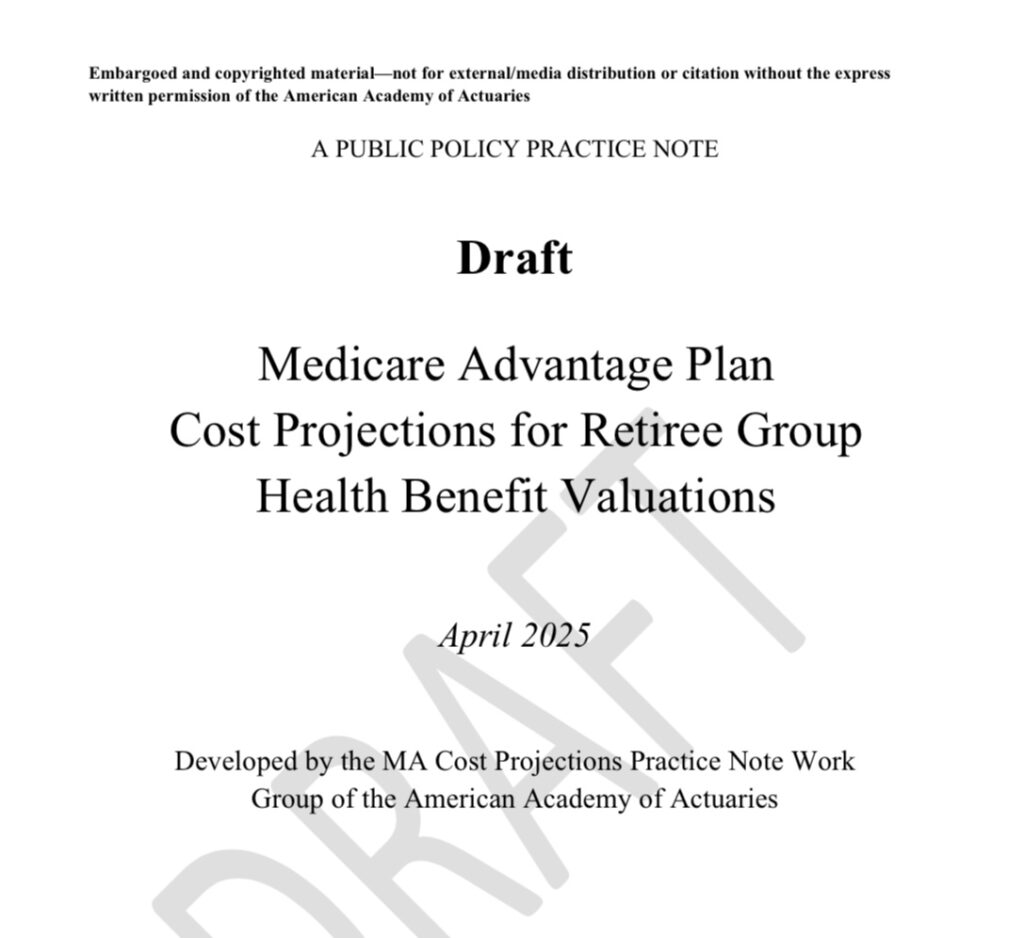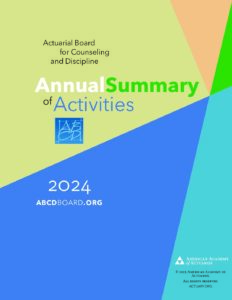Academy Conducts ‘Hill Visits’ With Federal Lawmakers in Washington

The Health Practice Council (HPC) joined other Academy practice councils for their annual “Hill visits,” meeting with congressional staff on Capitol Hill in Washington, D.C., April 2-4 on key health and other public policy issues.
More than 40 volunteers-including President Darrell Knapp, Immediate Past President Lisa Slotznick, Health Vice President Annette James, HPC Vice Chairperson Julia Lerche, and other health volunteers took part in the visits, covering Medicare/Medicaid, the Affordable Care Act, budget reconciliation, individual and small group markets, and other issues.

They visited offices including the Senate Health, Education, Labor & Pensions (HELP) Committee, the House Ways & Means Committee, the Senate Special Committee on Aging and the Senate Finance Committee, the House Education and Workforce Committee, the Congressional Budget Office, and the office of Rep. Don Beyer of Virginia.
“Hill visits are always a great time for the Academy to showcase its expertise-our wealth of knowledge that policymakers can take advantage of,” James said, adding that “there’s a new administration, and new faces” in the nation’s capital. Key health issues discussed included access, affordability, and quality health care, she said.
▶ Actuaries in Action-Watch a one-minute video recapping the Hill visits on the Academy’s YouTube channel.
▶ Actuarially Sound-For more on the Hill visits, see the Actuarially Sound blog post.
At the end of day, the most important message to articulate to congressional staff is that the Academy can assist them on policy questions they may have, Lerche said. “I’m interested to hear what legislators and their staffs are thinking about this year, what problems they are trying to address, what solutions they are evaluating, and where we can be helpful in providing unbiased information to inform their decision making,” she said.
Key HPC takeaways:
- Lots of synergy with HPC priorities;
- Interest in participating in Academy webinars/events; requests for deep dive follow-up with key constituencies
- Interest in recent HPC issue briefs including Ensuring Access, Affordability, Choice, and Competition in the Individual Health Insurance Market; Medicaid Per-Capita Caps: Design Considerations and Policy Implications; and The State of Long-Term Care Insurance-2025.
First-time Hill visits participant Chris Lombardi, a 2024 Academy Rising Actuary Award recipient, and a member of the HPC’s Active Benefits Subcommittee, said the event gave him a different perspective on the work he does daily.
“I really like to take a step back,” he said. “We get caught up in the day-to-day, spreadsheets, and crunching numbers. I like to be involved in more academic, theoretical, high-level discussions.”
Medicare Advantage Practice Note Open for Comment
The MA (Medicare Advantage) Cost Projections Practice Note Work Group of the Health Practice Council’s Retiree Benefits Committee has released a draft practice note titled Medicare Advantage Plan Cost Projections for Retiree Group Health Benefit Valuations.
The practice note seeks to provide additional information to actuaries who are working to determine how to project the cost of Medicare Advantage plans within a retiree group health benefit valuation.
The comment deadline is June 30. Please send comments and feedback to Academy Health Policy Project Manager Matthew Williams (williams@actuary.org).
Academy Unveils Revamped Website
The Academy’s revamped website offers streamlined navigation, a new resource center, and improved functionality. Looking for health resources?
- The Health section under “Policy + Research” shares recent activities from the Health Practice Council.
- Trending Topics, found on the home page under “Popular Links,” highlights top issues and related resources.
- The Resource Center allows users to filter by topic, practice area, and resource type.
Members are invited to share feedback via the website feedback form.
Committee Comments on House Budget Resolution
The Individual and Small Group Markets Committee submitted comments to the U.S. House Budget Committee on reconciliation legislation before the May 22 House vote on the federal budget bill. The comments focus primarily on proposed changes to the individual health insurance market.
The committee submitted a letter in September 2022 to the Center for Consumer Information and Insurance Oversight (CCIIO), which further addresses considerations and concerns with cost-sharing reduction premium load factors within individual health insurance markets.
Health Vice President Annette James and Senior Health Fellow Cori Uccello spoke with congressional staff following the submission of the Academy’s comments, at their request. The Academy will continue to engage with Congressional leadership and staff as the budget language makes its way to the Senate for consideration.
Early Discounts Available for November’s Life and Health Qualifications Seminar
Early registration discounts are available for the 2025 Life and Health Qualifications Seminar, set for Nov. 17-20 in Arlington, Va., just outside of Washington, D.C. New this year will be separate life and health tracks, following a day of general education.
Registration is limited for the popular seminar, which delivers three days of training and instruction-plus an optional three-hour exam on the fourth day.
The annual LHQ Seminar can serve as a basic education refresher or as a source of required CE. Get your early discount now-this event usually sells out each year so make sure to register soon.
Academy Presents at NAIC Spring Meeting
The Health Practice Council and other Academy practice councils presented at the NAIC Spring National Meeting in late March in Indianapolis. Academy President Darrell Knapp represented the Academy-including giving updates on ABCD and the Committee on Qualifications.
HPC presentations included:
▶ A presentation on recent HPC activity to NAIC’s Health Actuarial (A) Task Force (HATF).
▶ Health Solvency Committee Chairperson Steve Guzski presented to NAIC’s Health RBC (E) Working Group on the “H2 Underwriting Risk Component and Managed Care Credit Calculation in the Health Risk-Based Capital Formula – Final Report.” The report itself was finalized in April and has been sent to the NAIC.
▶ Long-Term Care (LTC) Committee member Steve Schoonveld presented on LTC insurance to NAIC’s Senior Issues (B) Task Force.
These contributions reflect the Academy’s commitment to sound public policy and actuarial professionalism-highlighting the value of membership for U.S. actuaries and their employers, and the Academy’s role as a trusted resource for regulators and policymakers.
▶ Recording Recap-A public policy recording features practice-area project managers recapping the meeting. Watch the recap on the Academy’s YouTube channel.
▶ SOA podcast-Senior Director of Public Policy Geralyn Trujillo is featured on a Society of Actuaries podcast recapping the NAIC meeting.
▶ Actuarially Sound-An Actuarially Sound blog post shares key takeaways from the NAIC meeting. The NAIC Summer National Meeting is scheduled for Aug. 10-13 in Minneapolis.
Issue Briefs Examine Individual Market, Medicaid Per-Capita Caps
An Individual and Small Group Markets Committee issue brief, Ensuring Access, Affordability, Choice, and Competition in the Individual Health Insurance Market, gives an overview of how the individual market’s rules build upon risk pooling’s foundation by supporting increased access to coverage, improving affordability, enhancing choice, and encouraging insurer competition.
▶ Medicaid Per-Capita Caps-The Medicaid Committee released an issue brief, Medicaid Per-Capita Caps: Design Considerations and Policy Implications, which focuses on per-capita caps, discussing some of the key design considerations and the potential implications of design decisions.
Professionalism Corner
ABCD Releases Annual Summary of Activities
The Actuarial Board for Counseling and Discipline (ABCD) released its Annual Summary of Activities, outlining its 2024 work, which included handling 108 cases, 96 requests for guidance (RFGs), and 12 inquiries. The ABCD also conducted 20 presentations, both virtually and in person, for actuarial organizations, annual conferences, and firms. Of note, ABCD members Al Beer and Cande Olsen conducted a well-received mid-year webinar on the RFG service. The report also details additional outreach and engagement efforts, along with examples of cases handled.
HPC Comments on ASOP No. 41
The HPC and other practice councils submitted comments to the Actuarial Standards Board (ASB) on the second exposure draft of Actuarial Standard of Practice (ASOP) No. 41, Actuarial Communications, which affects all practice areas.
Highlights From
HealthCheck

Prefer to watch your news? Check out this “Highlights From HealthCheck” video for a quick recap of what you need to know.
June 6 Deadline for Academy Award Nominations
Nominations remain open for the Academy’s annual service and recognition awards. Nominate your peers for the Rising Actuary Award, Robert J. Myers Public Service Award, Jarvis Farley Service Award, and the Outstanding Volunteerism Award. Nominations are due June 6. Read more and submit at actuary.org/awards.
In the News
Academy Board Member and HPC Vice Chairperson Julia Lerche discussed trends in Medicaid managed care utilization and the state rate adjustment process with the subscriber-only Health Payer Specialist.
CBS News quoted Senior Health Fellow Cori Uccello in a story on physical therapy insurance coverage session limits.
BenefitsPro reported on individual coverage health reimbursement arrangements drawing from the recent HPC issue brief on the individual market.
InsuranceNewsNet cited Long-Term Care Committee member Steve Schoonveld’s comments on LTC insurance to the NAIC’s Senior Issues Task Force.
Legislative/Regulatory Activity
Federal
During the first 100 days of the Trump administration (through the end of April), the Department of Government Efficiency (DOGE) cut billions of dollars in Department of Health and Human Services (HHS) grants meant for state and local health departments as well as for research purposes. Additionally, a DOGE-led reorganization of HHS resulted in 10,000 full-time positions being cut.
President Trump issued an April 15 executive order directing HHS to take steps to significantly reduce drug prices for American patients. It calls for improving the Medicare Drug Pricing Negotiation Program; aligning Medicare payment for certain prescription drugs with actual hospital acquisition costs; and standardizing Medicare payments for prescription drugs. It also provides direction related to prescription drug discounts for low-income patients.
President Trump signed a Feb. 25 executive order meant to enforce health care transparency reforms enacted during his first term in office. HHS, as well as the Labor and Treasury departments, are charged with ensuring hospitals and insurers disclose actual prices, not estimates, and were directed to take action to make prices, including prescription drug costs, comparable across hospitals and insurers.
Minnesota, Oregon, and Washington state sued the Trump administration in early February, arguing that an executive order restricting youth access to gender-affirming care violates the U.S. Constitution. The lawsuit, which was filed in U.S. District Court for the Western District of Washington, seeks an injunction against President Trump’s executive order directing the HHS and other federal agencies to examine policies related to gender-affirming care for children and teens.
The Centers for Medicare & Medicaid Services (CMS) in March issued a wide-ranging 2025 Affordable Care Act Marketplace Integrity and Affordability proposed rule. The proposed rule addresses issues that include the standards relating to past-due premium payments; excludes Deferred Action for Childhood Arrivals (DACA) recipients from such plans; and prohibits issuers of coverage subject to essential health benefit requirements from providing coverage for sex-trait modification.
Rep. Tom Suozzi of New York introduced HR 2082, which would amend Title II of the Social Security Act to provide for LTC insurance benefits, covering six hours of care a day for individuals who are above full retirement age and meet other specific requirements.
Rep. Lloyd Smucker of Pennsylvania introduced HR 2013, providing occupational therapy coverage for home health services under the Medicare program for low-income persons.
Rep. Michelle Fischbach of Minnesota introduced HR 1303, prohibiting the HHS secretary from implementing, administering, or enforcing minimum staffing standards for long-term care facilities or Medicaid institutional payment transparency reporting provisions.
Rep. Robert Onder of Missouri introduced HR 2571, amending ERISA to exclude certain medical stop-loss insurance obtained by some group health plan sponsors from the definition of health insurance coverage.
State
North Dakota Gov. Kelly Armstrong signed HB 1584 in late April, granting the state’s Insurance department the authority to regulate pharmacy benefit managers (PBMs) and closing the state’s Drug Pricing Transparency Fund and transferring the balance into a newly established fund.
Washington Gov. Bob Ferguson signed HB 1686 on April 22, which requires certain health care entities to submit ownership, affiliation, and services information to the Department of Health (DOH) on an annual basis. The DOH is tasked to create an interactive tool which will allow the public to search and view the submitted information.
Oregon Gov. Tina Kotek signed HB 2010 on April 21, retaining certain provider taxes in place by extending the assessment on earnings from health plan premiums, payments by the Oregon Health Authority to managed care organizations, on hospitals, and on the Oregon Reinsurance Program.
Alabama Gov. Kay Ivey signed SB 252, providing for the regulation of PBMs by the Commissioner of Insurance and regulating rebates from drug manufacturers to PBMs.
New Mexico Gov. Michelle Lujan Grisham signed SB 120, permanently eliminating behavioral health services cost-sharing from group health coverage, including any form of self-insurance offered, issued, or renewed under the Health Care Purchasing Act that offers coverage of behavioral health services.
Gov. Lujan Grisham also signed HB 78, prohibiting discrimination against entities that participate in the federal 340B drug pricing program. Manufacturers of prescription drugs cannot interfere with 340B drug acquisition, contracting, or delivery to contracted pharmacies authorized to receive and dispense 340B drugs.
New York’s Department of Financial Services adopted new language on March 18 relating to the collection of demographic information by health insurers. It calls on providers to request information regarding an insured’s and a covered dependent’s race, ethnicity, preferred language, sexual orientation, and gender identity or expression, so long as it is voluntarily provided as part of separate and supplemental questionnaire.
Vermont Gov. Phil Scott signed H 35, permitting health insurers to determine the premiums for its individual market plans separately from the premiums for its small group market plans. Additionally, it guarantees coverage of all small employers, their employees, and their employees’ dependents for any health benefit plan, regardless of any outstanding premium amount a subscriber may owe to the carrier for the previous plan year.
Virginia Gov. Glenn Youngkin signed several health-related measures during the 2025 General Assembly session, including:
▶ SB 1311/HB 2392, removing hospitals, as defined in existing law, from the exemption to the definition of covered entity relating to PBMs (March 24).
▶ HB 2375, requiring pharmacy services administrative organizations to submit information on reimbursement rates and fees to the nonprofit data services organization that contracts with the state’s Department of Health to provide prescription drug price transparency information (March 21).
▶ SB 925/HB 2085, requiring a health insurer to notify the medical provider in a provider contract if the insurer, or entity completing a transaction on behalf of the insurer, uses a payment method that imposes a processing fee on the provider, and to offer the provider an alternative payment method that does not impose such a fee (March 21).
▶ HB 2097, updating existing mandated coverage requirements for prostate cancer screenings to reflect updated tests and guidelines from the American Cancer Society (March 21).
▶ HB 2592, requiring that insurance carriers create an online process that provides real-time patient out-of-pocket costs for prescription drugs by July 1 (March 21).
▶ SB 1215/HB 2099, requiring the inclusion of provisions governing the prior authorization process in certain health insurance contracts which gives an insurance carrier the right or obligation to require prior authorization for a health care service (March 18).
Health News in Brief
The HPC released a summary of findings from a Society of Actuaries Research Institute report, The ACA @ 15-Tracking Prior and Emerging Results since its Inception, that discusses the report’s policy implications.
The Health Solvency Committee’s Health Underwriting Risk Factors Analysis Work Group sent the final H2-Underwriting Risk Component and Managed Care Credit Calculation in the Health Risk-Based Capital Formula Report to the NAIC’s Health Risk-Based Capital (E) Working Group. The work group presented on the report at the NAIC Spring Meeting in Indianapolis.
The Individual and Small Group Markets Committee sent a comment letter to the Centers for Medicare & Medicaid Services on the proposed rule, Patient Protection and Affordable Care Act; Marketplace Integrity and Affordability.




